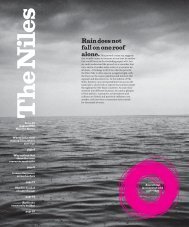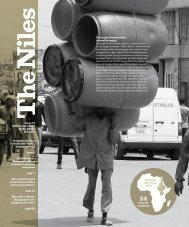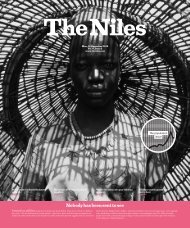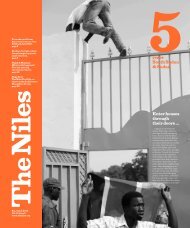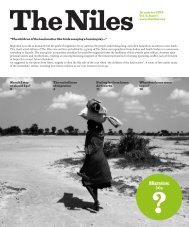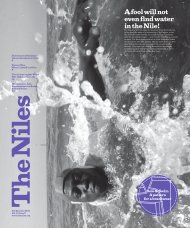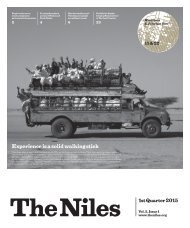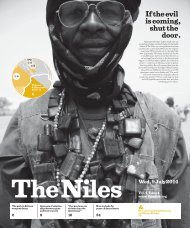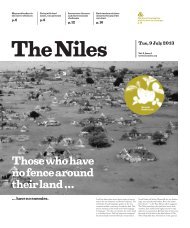When deeds speak, words are nothing
Speaking about sustainable development is easy. Acting sustainably is another matter. And now the evidence is unequivocal: Mankind’s impact on nature is causing the climate to change rapidly and drastically, threatening the environment and the very resources we need to survive. Aware that humanity is careening close to the edge, The Niles correspondents set out to explore where and how people in the Nile Basin region rethink. So much of their findings for now: We are an endlessly innovative species. Cooperation is our superpower. When deeds speak, words are nothing.
Speaking about sustainable development is easy. Acting sustainably is another matter. And now the evidence is unequivocal: Mankind’s impact on nature is causing the climate to change rapidly and drastically, threatening the environment and the very resources we need to survive. Aware that humanity is careening close to the edge, The Niles correspondents set out to explore where and how people in the Nile Basin region rethink. So much of their findings for now: We are an endlessly innovative species. Cooperation is our superpower. When deeds speak, words are nothing.
You also want an ePaper? Increase the reach of your titles
YUMPU automatically turns print PDFs into web optimized ePapers that Google loves.
re<think
the way
we eat
“We want
equality,
to be treated
the same way
they treat
big-scale
farmers.”
a group and tried going to the ministry to
get fertilisers and discuss other issues we face.
Someone gave us a warehouse to keep gas,
and the ministry arranged for us to access
a reasonable amount to be made available
regularly. However, they stopped the process
in less than two months and ordered us to
get it from the gas stations. We had to resort
to the black market due to the gas crisis, which
adds even more expenses,” explains Yasin.
He added that due to all these challenges,
he had to let go of labourers. These days he
manages the farm primarily by himself and
one worker. Yasin tells The Niles that he doesn’t
seek financial aid from the government – he
just wants them to do their duties by providing
fertilisers and gas.
“We want equality, to be treated the same
way they treat big-scale farmers. My farm needs
half a barrel for one round of irrigation (with
subsidised gas, this costs around SDG 40,000
SDG (USD 90) or twice as much on the black
market). Crops need to be irrigated around
four times on average. We also have problems
regarding spare parts and general price increases,”
he says.
As problematic as it may be, cultivating the
crops is followed by the process of distribution
and sales. And this part is more challenging
than it seems. “Market brokers are a big problem
for us. They monopolise sales and distribution,
buying from us at low prices and selling at
much higher prices. We can’t make direct-selling
points as they will fight us every step of
the way”, says Abdul Wahab.
To address this issue, Ali explains that in
some of the projects handled by the company
she works for, they tried to establish centres
for direct selling to the consumers. However,
they were discouraged by the obstacles from
governmental institutions.
“Middlemen are a major issue, and due to
the severe lack of supervision, they have thrived
and keep pressuring the farmers on prices and
increasing it for consumers to gain the maximum
profit,” she adds.
The way out of the woods
The complicated issues affecting Tuti Island
farmers cannot be solved without governmental
intervention, and the same applies to the
nationwide agricultural challenges. Yet, more
sustainable agricultural schemes, where
farmers achieve self-sufficiency and combine
farming with other activities, might be a step
in the right direction.
“One of the issues in farming is labourers.
Most agricultural lands are far from urban
areas, so farmers would need to provide food
and accommodation. They would need to
develop other small projects, raising chickens,
sheep, cows and planting various vegetables
and fruits if possible. This way, labourers would
be properly fed and increase their production
in terms of quantity and quality. We implemented
such modules and achieved great success.
We also added fish farms to some of the projects,”
Ali says.
She further says that cultivating more
than one type of crop or vegetable enhances
the farmer’s economic viability. Knowing what
variety to grow and when, starting with those
with short grow times, will help farmers stay
productive around the year. Meanwhile, having
several types of products helps them improve
sales, meaning they are not dependent on one
commercial product that is susceptible to the
whims of the market. In a way, they could also
weaken brokers’ grip on the market.
This, of course, doesn’t come without
challenges, such as the expense of animal
feed. However, these issues can be addressed
in small steps such as planting and preparing
fodder within the farms, selling other products
such as milk, eggs and meat, and using the
livestock waste as organic fertilisers. On Tuti
Island, some people are slowly starting to
consider making small changes, such as Yasin,
who recently introduced cows and sheep to
his farm.
“This module of sustainable farming is
part of the solution to Sudan’s agricultural
issues, and it can encourage people to practice
farming. They will increase their productivity
and become self-sufficient along with their
families. And that means they will be better
nurtured and will cut their expenses, besides
running a successful and sustainable business,”
Ali says.
A worker on Mahmoud
Yasin farm.
Photo: The Niles /
Elzahraa Jadallah
36









